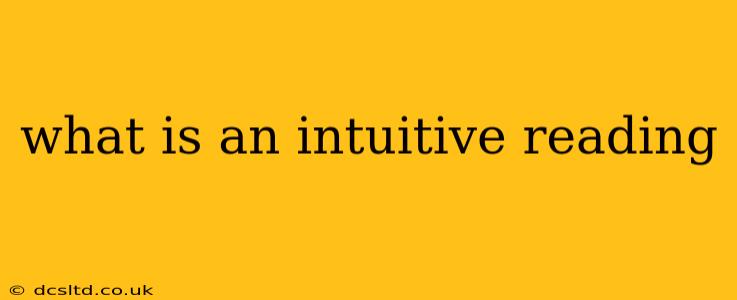Intuitive reading, also sometimes called psychic reading or intuitive sensing, is the practice of gaining information through means other than the five traditional senses. It's about tapping into a deeper, inner wisdom – a connection to a source of knowledge beyond the realm of conscious thought. This information can manifest in many forms, guiding decisions and offering insights into various aspects of life. It's not about predicting the future with certainty, but rather about receiving guidance and understanding.
This practice doesn't rely on logic, reason, or concrete evidence in the way traditional analytical methods do. Instead, it involves accessing information through intuition, a subtle inner knowing, and sometimes even seemingly supernatural means. Think of it as accessing a deeper well of knowledge within yourself or a connection to a universal source of information.
How Does Intuitive Reading Work?
The exact mechanics of intuitive reading remain a subject of debate and exploration. Different practitioners may describe their experiences differently, but some common themes emerge:
- Intuition: This is the core of intuitive reading. It's that gut feeling, that inner knowing that something is right or wrong, without conscious reasoning. Intuitive readers develop and refine their ability to trust and interpret these feelings.
- Psychic Abilities: Some practitioners believe intuitive reading involves extrasensory perception (ESP), allowing access to information beyond the normal range of senses. This can manifest as clairaudience (hearing information), clairvoyance (seeing information), clairsentience (feeling information), or claircognizance (knowing information).
- Energy Sensing: Many intuitive readers believe they tap into the energy fields of individuals or situations, interpreting the subtle vibrations and patterns to gain insight.
- Spiritual Connection: A spiritual or meditative connection is often seen as a crucial component, fostering a receptive state of mind that allows intuitive information to flow more easily.
What Types of Questions Can Intuitive Reading Answer?
Intuitive reading isn't about finding concrete, definitive answers like a search engine. Instead, it offers guidance and insights, prompting introspection and self-discovery. Here are some types of questions people often seek answers to through intuitive reading:
- Relationship issues: Understanding dynamics, challenges, and potential paths forward in romantic relationships, family relationships, or friendships.
- Career decisions: Gaining clarity on career paths, potential opportunities, and aligning your work with your true purpose.
- Personal growth: Identifying areas for self-improvement, understanding limiting beliefs, and uncovering hidden potential.
- Life purpose: Discovering your passions, purpose, and direction in life.
- Spiritual development: Gaining deeper understanding of your spiritual path and exploring your connection to something larger than yourself.
What is the difference between intuitive reading and tarot reading?
While both intuitive reading and tarot reading can offer guidance and insights, they differ in their methods. Intuitive reading is a broader term encompassing various ways of accessing information intuitively, while tarot reading uses a deck of cards as a tool to facilitate the intuitive process. The tarot cards serve as prompts and catalysts, helping the reader access and interpret intuitive messages. Intuitive reading can be done without any tools at all, relying solely on inner knowing.
How accurate are intuitive readings?
The accuracy of intuitive readings is subjective and depends on various factors, including the skill and experience of the reader, the clarity of the question, and the receptivity of the recipient. It's crucial to remember that intuitive readings offer guidance and insights rather than concrete predictions. They are tools for self-reflection and understanding, not guarantees of the future.
Is intuitive reading the same as psychic reading?
The terms "intuitive reading" and "psychic reading" are often used interchangeably. However, "psychic reading" sometimes implies a stronger emphasis on extrasensory perception and supernatural abilities, while "intuitive reading" might encompass a broader range of methods, including those grounded in introspection and self-awareness. Essentially, they overlap considerably.
How can I improve my own intuitive abilities?
Developing your intuition involves practice and self-awareness. Meditation, mindfulness, journaling, spending time in nature, and paying attention to your gut feelings are all excellent ways to strengthen your connection to your inner wisdom. Regular practice helps build trust in your intuition and refine your ability to interpret its subtle messages.
By understanding the principles and nuances of intuitive reading, you can begin to explore this fascinating path of self-discovery and gain valuable insights into your life. Remember, it's a journey of inner exploration and connection, offering guidance and understanding rather than definitive answers.
